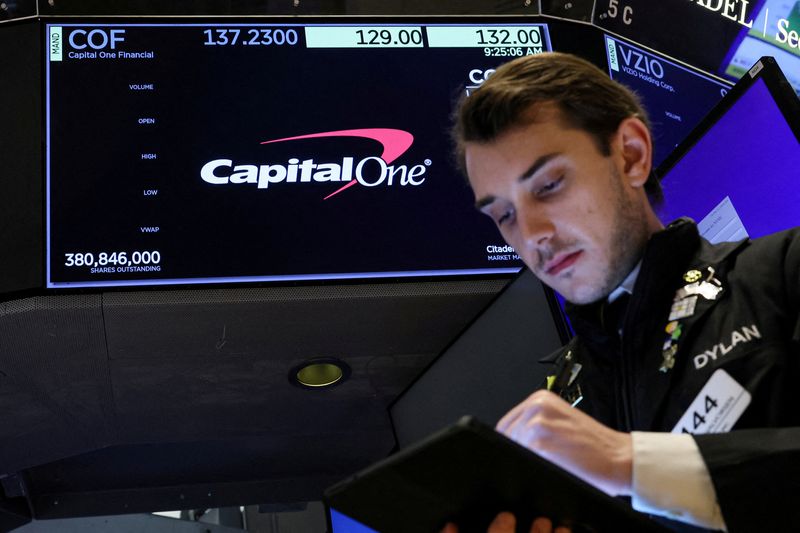By Michelle Price and Carolina Mandl
(Reuters) - Capital One's chances of getting its $35.3 billion deal for Discover Financial past regulators hinge on the bank showing it can disrupt the close-knit U.S. credit card industry, five experts in corporate law interviewed by Reuters said.
Investors are assigning only a 50% chance to the deal being completed amid concerns the proposed acquisition could become a lightning rod for U.S. regulators and lawmakers fretting over high credit card interest rates and fees.
To boost its chances of getting the deal approved, Capital One will have to show it will share some of the deal's $2.7 billion in projected pre-tax cost-savings with consumers, the people said.
"At the end of the day, the current regime of regulators wants to know if, and how, this merger will benefit consumers," said Abiel Garcia, a former deputy attorney general for the California Department of Justice who is now an antitrust lawyer with Kesselman, Brantly & Stockinger.
Combining Capital One and Discover, the top four and five players in the U.S. credit card market by loans, would create the biggest issuer with around $250 billion in card balances and a market share of 22%, according to TD Cowen analysts.
Capital One would have to convince regulators this heft would make its offerings cheaper rather than more expensive, legal experts said. In theory, Capital One could do this because by owning the Discovery (NASDAQ:WBD) payment network it would not have to pay access fees as it does to Mastercard (NYSE:MA) and Visa (NYSE:V).
Spokespeople for Capital One did not immediately respond to a request for comment on the impact the acquisition would have on how much it charges consumers. In announcing the transaction, Capital One and Discover said it would result in "great deals for consumers and small businesses" but gave no details.
"I think it's an overwhelmingly pro-consumer acquisition because it increases the power of another network," said William Nygren, U.S. chief investment officer at Harris Associates, one of Capital One's top investors.
Spokespeople for the Office of the Comptroller of the Currency and the Federal Reserve, which have to sign off on the deal, did not provide comment. Spokespeople at the Federal Trade Commission and the U.S. Department of Justice, which review mergers for antitrust concerns, declined to comment.
Capital One is one of the U.S. credit card issuers that charge consumers the most, with annual percentage rates exceeding 30%, according to a Consumer Financial Protection Bureau survey published last week. The survey found the bigger the credit card issuer, the more likely it was to charge consumers more in interest.
However, George Alan Hay, an antitrust professor at Cornell University law school, said Capital One may be able to argue the deal would not fundamentally change the card issuer competitive landscape in terms of market share "because no one is going to have a monopoly."
The deal also comes amid congressional scrutiny of card fees which has been stoked in part by merchants, a powerful force in Washington that could advocate on Capital One's behalf.
Lawmakers such as Senate Majority Whip Dick Durbin, a Democrat who represents Illinois where Discover is based, have criticized Visa and Mastercard for a hold on the market.
"The credit card market is so devoid of competition ... that almost any change is probably an improvement," said Doug Kantor, general counsel of the National Association of Convenience Stores.
After labor, credit card fees are the second largest operating cost for convenience stores, he said. The deal could be helpful if Capitol One "positioned themselves as a major competitor to Visa and Mastercard" and helped drive down fees, Kantor said.
A Mastercard spokesperson said Capital One's partnership with Mastercard "will continue for the long-term." Visa did not respond to requests for comment.
WILD CARD
To be sure, antitrust enforcers are often skeptical of acquirers playing consumer champions.
A U.S. judge last month blocked JetBlue's attempt to acquire Spirit Airlines (NYSE:SAVE) after the companies failed to show the deal would boost Spirit as a budget airline and lead to lower fares.
But Brian JM Quinn, a Boston College Law School professor focusing on corporate transactions, said the difference with Discover is that it is much smaller than Mastercard and Visa, and Capital One could argue Discover needs its resources to compete more.
"To that extent, it could be very pro-competitive and attempts to block this deal could simply reinforce Visa and Mastercard's dominant market position," Quinn said.

One major wild card is the timing of the deal, coming during a U.S. presidential election year when politicians are keen to play consumer advocates. Democratic Senator Elizabeth Warren, for example, on Tuesday called for the deal to be blocked.
"I think the bigger question is what do we see out of the populist wing of the Republican Party," said Jeremy Kress, University of Michigan professor of law and a former Fed M&A attorney. "There's a potential that some of the more vocal populists on the right could push back as well."